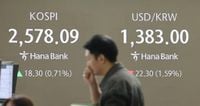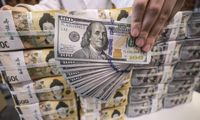On May 7, 2025, the Korean Won/US Dollar exchange rate opened at 1,380 won in the Seoul foreign exchange market, marking a significant drop of over 25 won from the closing price of 1,405.3 won on May 2, 2025. This is the first time the exchange rate has started trading at this level since November 8, 2024, when it was 1,386 won. The opening price on this day is also the lowest since November 6, 2024, when it was 1,374 won.
The dollar index, which measures the value of the dollar against six major currencies, recorded a decrease of 0.33%, settling at 99.463. Analysts attribute the strengthening of the won to the recent performance of other Asian currencies, particularly the Chinese Yuan and the Taiwan dollar, which have shown signs of strength during the recent holiday period in Korea.
U.S. Treasury Secretary Janet Yellen is set to meet with Chinese Vice Premier He Lifeng in Switzerland on May 8, 2025, to discuss various economic issues. This meeting has been viewed as a potential first step towards negotiations that could ease ongoing trade tensions between the two nations. According to Reuters, this could be the beginning of significant negotiations, especially as China may consider depreciating the Yuan if trade talks extend over a longer period.
Market expectations of a trade agreement have contributed to the recent fluctuations in the exchange rate. Scott Besent, the U.S. Treasury Secretary, hinted at the possibility of concluding agreements with several major countries this week, which has fueled optimism in the markets. The strength of the Taiwanese dollar, which is expected to appreciate as Taiwan engages in negotiations with the U.S., has also impacted the overall strength of Asian currencies, including the won.
Lee Min-hyuk, a researcher at KB Kookmin Bank, noted, "Further declines are possible due to dollar weakness, but bargain buying may support the downside." He indicated that while there could be additional drops in the exchange rate, the recent sharp declines may lead to increased buying activity, which could stabilize prices in the short term.
As of 9:10 AM on May 7, the exchange rate had further decreased to 1,385.8 won, down 19.5 won from the previous trading day's close. The drop in the opening price compared to the previous week's closing price was the most significant since October 10, 2024, when it fell by 38.1 won.
The exchange rate falling into the 1,300 won range during weekly trading is a notable occurrence, as it is the first time this has happened since December 2, 2024, when the market was reacting to the martial law situation in the country. The overnight trading on May 2 saw the exchange rate dip to 1,391.5 won before closing at 1,401.5 won.
In addition to the influence of external negotiations, the recent strength of the Yuan has also played a role in the performance of the won. As the Chinese currency gains strength, it tends to bolster other Asian currencies, including the won, creating a ripple effect in the region's foreign exchange markets.
Market analysts are closely monitoring the developments of the U.S.-China trade talks, as any agreements reached could significantly impact currency valuations moving forward. The potential for a resolution could alleviate some of the uncertainty that has been plaguing investors and traders alike.
The KOSPI index was also reflecting positive sentiment, rising by 16.83 points (0.66%) to reach 2,576.62 as of 9:02 AM on May 7, 2025, while the KOSDAQ index saw a slight decline of 0.77 points (0.11%) to 721.09.
As the situation continues to evolve, the interplay between the won and the dollar will remain a topic of interest for investors, policymakers, and economists alike. The actions taken by the U.S. and China in the coming days will likely set the tone for market dynamics in the weeks and months to follow.
In summary, the Korean Won's performance against the U.S. Dollar reflects broader trends in the Asian currency markets, driven by expectations of trade negotiations and currency strength across the region. With key meetings on the horizon, all eyes will be on the outcomes that could shape economic relations and currency valuations moving forward.





